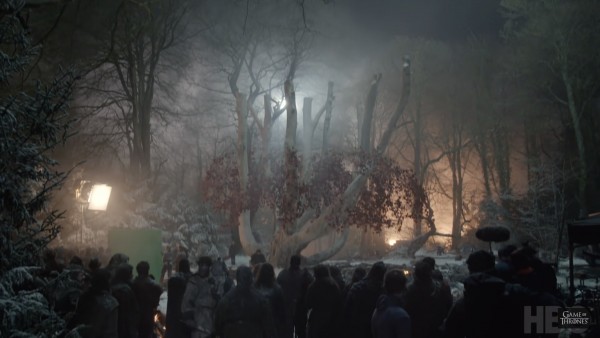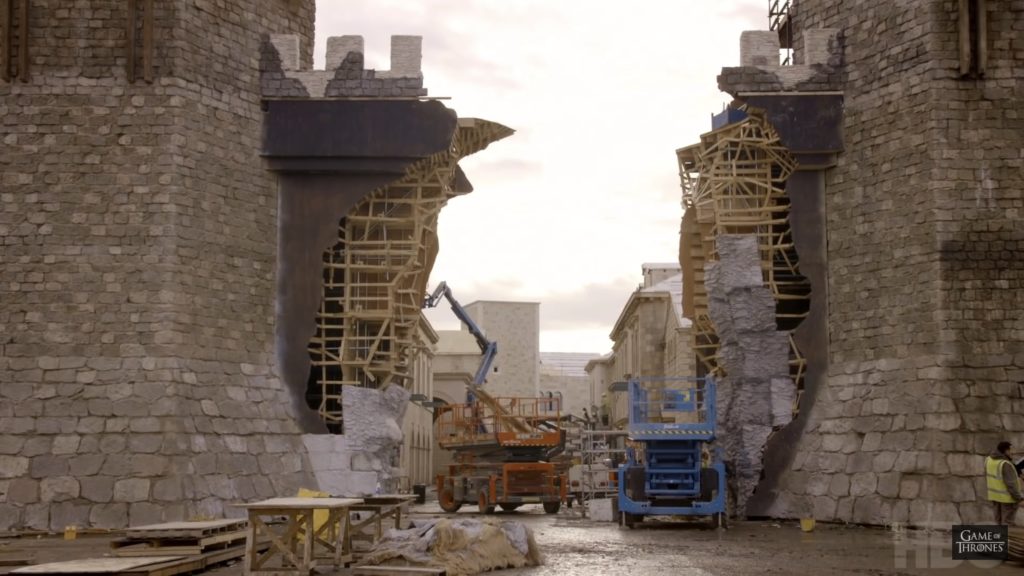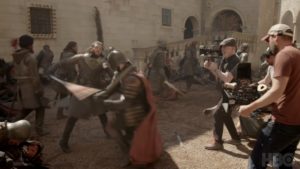Pretty much every Game of Thrones fan who’s been around the internet enough has heard of Miguel Sapochnik (pictured on set), 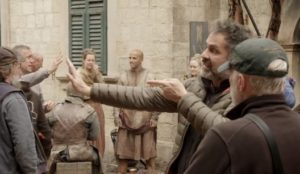
The first time Sapochnik’s name popped up on a GoT episode was on season 5, for the episodes “The Gift” and the fan-favorite “Hardhome“- one presenting a calm-before-the-storm mostly Drama piece and the other remains one of the most ambitious endeavors on the show’s entire run. After how well he had done they invited him to direct the big one- “Battle of the Bastards (BotB), and also the next episode “The Winds of Winter;” the one with Cersei’s trial, Jon Snow’s coronation, the Tower of Joy flashback, among other iconic scenes.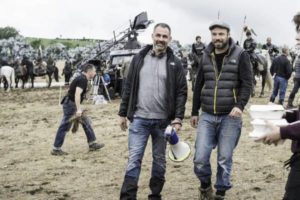
We’ll get to episode 5 as well in a second, but let’s focus now on “The Long Night” at first. According to Entertainment Weekly, filming this episode required 55 total night shoots and an unknown number of days shooting in indoor stages, with around 750 cast and crew members all participating in the effort while enduring the extreme Northern Ireland cold. Several actors described this episode as the hardest thing they ever had to execute in their lives, with Maisie Williams (Arya Stark) saying “Nothing can prepare you for how physically draining it is. It’s night after night, and again and again, and it just doesn’t stop. You can’t get sick, and you have to look out for yourself because there’s so much to do that nobody else can do”. As we all know by now, Arya had a huge part in the battle against the Army of the Dead, not only in finishing the entire war but exhausting herself through the entire Long Night. When the episode was in initial stages of planning, almost a 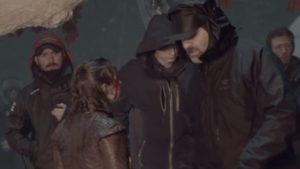
While preparing for the shoot, Sapochnik tried to find a longer battle sequence in cinematic history and simply couldn’t. Writing the episode, D&D intended it to be the longest battle sequence ever presented in a film or a television series and eventually, it was not only the longest one on television history but also the longest overall running episode in the entirety of GoT.
According to the Sapochnik interview, he was involved in the pre-planning of the episode ever since June 2017. In this particular battle, the production took GoT‘s well known realistic style of filmmaking to the next level, wanting to shoot as less as possible in front of a green screen. For that reason the Winterfell set was built almost like an entire actual castle, with halls, courts and alleys- in a way the actors could actually interact with their surroundings while faking the fight, and not just imagine themselves in a battlefield while they are actually in an air-conditioned green room. “The Winterfell set is unlike anything I’ve seen in my life,” Jacob Anderson, the actor who plays Grey Worm 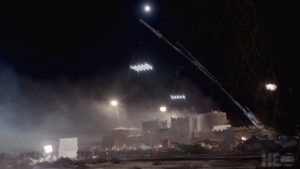
In my opinion, all the hard work put in this episode really added up to a masterful product, with the most amazing spectacle I’ve yet to witness on television. “The Long Night” is the episode Sapochnik rightfully chose as his submission in the Emmys this year, but looking at his work on the Eighth season of GoT as a whole, one cannot simply ignore his other episode, “The Bells”. I rather not get into the subject of why I think Daenerys’ ascent to madness made absolute sense in the context of the events of the season, but I rather focus again on the directorial effort that had to be done from Sapochnik and his crew.
First I’d like to start by suggesting a round of applause for Sapochnik frequent collaborator cinematographer Fabian Wagner, that did an amazing job with everything regarding filming this episode. The cinematography in the eighth season was even better than usually, and I think episode 5 is a great example for that. Much like “The Long Night”, the crew of the show built an entirely new set especially to when Miguel and his fellas arrive, this time for the Battlements of King’s Landing. Here too, it was extremely important to preserve the authenticity of everything that’s getting shot, even if it means blowing up much of what you spent weeks building once Daenerys’ Dragon sucker punches the Golden Company from behind.
Facing the same challenge as in “The Long Night”, Sapochnik had to choose which character will be the audience’s anchor to the scene. In an interview conducted with IndieWire, Miguel described that one of the decisions they made was that after you see everything that led Dany to her breaking point in the beginning of the episode, she and the Dragon “becomes one” and the point of view will not focus on her furthermore, but on the people on the ground experiencing the destruction, with the question of “what have we become?” constantly looming in the background.
“What I wanted to get to in Kingʼs Landing was the idea that every single one of these characters matters. Not just the characters, but the extras, and the people you donʼt know, and all the people youʼll never see, and never know about. They all matter” said Sapochnik. “This idea that every single person that dies in this story, every kid, that little girl, they are people, and they have mothers, and fathers, like us. They had aspirations and dreams, and they got cut short by this event.”
Almost similar to what he’s done before episode 3, Miguel studied several videos of colossal destructions, real ones, and cinematic fictional ones, all the same, to try and see where his eye is going and what’s capturing his attention the most. He also intended to put a mirror in front of the viewer’s eyes, criticizing the cynicism that surrounds violence in entertainment these days;
“The destruction of Kingʼs Landing, for me, has always been an audience participation event. You wanted this. Is that really what you wanted?” He asked. “I felt like there was this thing of this bloodthirstiness that exists in the fans, for this payback that is personified by Dany. I wanted people to know how bad death and destruction can be in the safe environment theyʼre living in.”
On a more personal note, I was very satisfied with both of Miguel’s episodes in season 8, and consider them two of the greatest episodes in GoT’s entire run. The War for the Dawn was just as spectacular as I always imagined it would be, and The Bells was a more extraordinary climax for the entire series than I have ever hoped for. Ever since season 5 Sapochnik was my personal favorite director from GoT, and I was extremely relieved (yet not really surprised) he delivered everything that was promised from this season, and then some.
Let’s talk about the Emmy’s system of voting for a second. In the past, the system used by the Emmy voters was in the form of a preferential ballot where for example if there are a total of 5 episodes, each voter ranks all 5 episodes in his preferred order of winning. These days, each voter chooses only 1 episode he wishes would win the category, and that’s it. There are many pros and cons for both systems, but the new system, especially with the current lineup of nominated episodes in the Directing category, could be the thing that will frustratingly cost Sapochnik his win. 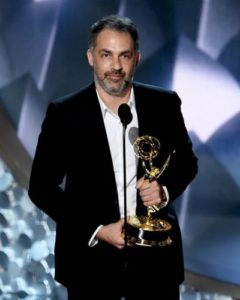
GoT is famously known for presenting us with episodes we’d never thought we’d see on small TV screens. After a handful of amazing battle episodes, it was only right that the final season will manage to top it all in terms of ambition, effort, scope and vision and take everything to the next level with both Sapochnik’s episodes. While one might have his own issues with story choices in the final season of GoT, the work Sapochnik did this season was undeniable and a monumental directorial achievement for television. A spectacle like that requires a story that will demand it, and that’s why I’m not exactly sure when will be the next time we’ll see something like that again on television, despite the high-level television have reached these days. One thing’s for sure though, I’d be extremely interested in whatever Sapochnik does next, and more importantly hope he will get his due in this upcoming awards season, to cement his groundbreaking work and achievements in history. “If Miguel lives through this it will be the hardest thing he’s ever done”- producer Bernadette Caulfield was quoted saying during production. “The hardest thing all of us have ever done”.
The Primetime Emmy Awards will take place this Sunday, September 22, 8pmET/5pm PT.




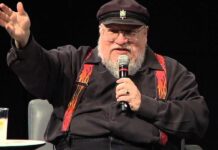
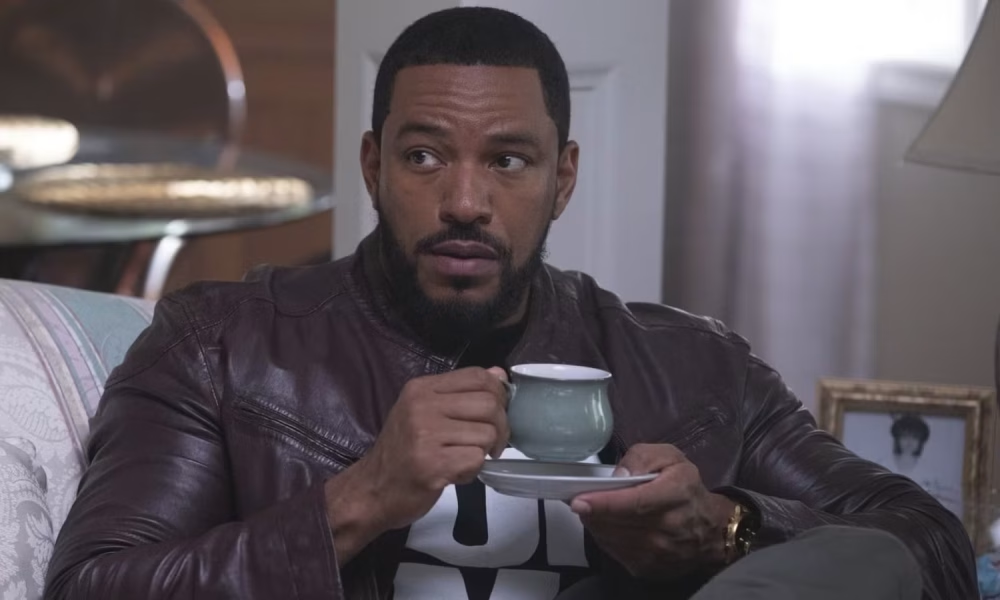














![[Book Review] The Blade Itself (The First Law Trilogy) by Joe Abercrombie](https://bendthekneegot.com/wp-content/uploads/2018/01/1516047103_maxresdefault-218x150.jpg)







